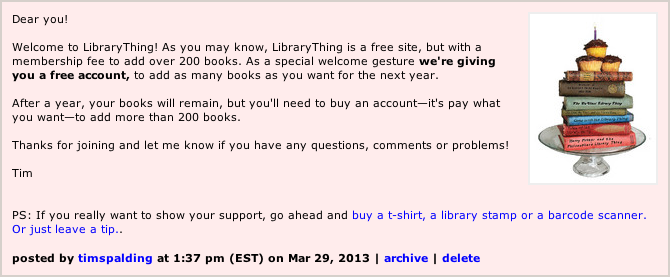
“Amazon Cardboard Boxes” by Flickr member
Akira Ohgaki (Attribution 2.0 Generic)
Summary: Amazon is requiring us remove links to other booksellers on work pages. We’re creating a new “Get it Now” page, with links to other booksellers, especially local bookstores and libraries, and a host of new features. Talk about it here.
The challenge. We’re days away from releasing a series of changes to our book pages, both forced and intentional. Amazon is requiring all websites, as a condition of getting any data from them, to have the primary page link to Amazon alone. Links to other booksellers are prohibited. Secondary pages—pages you go to from the primary page—can have non-Amazon links.
Everyone at LibraryThing disagrees with this decision. LibraryThing is not a social cataloging and social networking site for Amazon customers but for book lovers. Most of us are Amazon customers on Tuesday, and buy from a local bookstore or get from a library on Wednesday and Thursday! We recognize Amazon’s value, but we certainly value options.
Importanly, the decision is probably not even good for Amazon. Together with a new request-monitoring system, banning iPhone applications that use Amazon data, and much of their work on the Kindle, Amazon is retreating from its historic commitment to simplicity, flexibility and openness. They won through openness. Their data is all over the web, and with it millions of links to Amazon. They won’t benefit from a retreat here.
But agree or not, we have to follow their terms. We thought long and hard about giving up Amazon data entirely, converting to library data only, in concert with a commercial provider, like Bowker or Ingram, and with help from publishers and members. Unlike our competitors, who are exclusively based on Amazon and who don’t “catalog” so much as keep track of which Amazon items you have, that option is available to us. But we’d lose a lot, particularly book covers. Ultimately, we’ve decided the disadvantages outweigh the benefits.
 The Response. Most of all, we think we’ve found a way to give Amazon what they require, and continue to provide members with options: We’re going cut back our primary-page links to Amazon alone, and give people the best, most diverse secondary pages we can make. We are allowed to link to other booksellers, like IndieBound and Barnes and Noble on secondary pages, and we’re going to do it far better than we ever have. We’re going to take something away, but also make something better—something that goes way past what we did before, in features and in diversity of options.
The Response. Most of all, we think we’ve found a way to give Amazon what they require, and continue to provide members with options: We’re going cut back our primary-page links to Amazon alone, and give people the best, most diverse secondary pages we can make. We are allowed to link to other booksellers, like IndieBound and Barnes and Noble on secondary pages, and we’re going to do it far better than we ever have. We’re going to take something away, but also make something better—something that goes way past what we did before, in features and in diversity of options.
The upcoming “Get it Now” page will go far beyond our current “Buy, borrow, swap” links, with a live new and used price-comparison engine, as well as sections for ebooks, audiobooks and swap sites. The page will be edition-aware, and draw on feeds or live data (so the links work). Many members have wanted live pricing data for the books they already own and these features can be used for that purpose too. We’ll also be doing some stuff with libraries nobody else has, or can, do.
Key to the upcoming Get it Now page is a “Local” module, drawing on LibraryThing Local, showing all the libraries and bookstores near you. Where possible, this list will incorporate holdings data and links to buy—the sort of information you never get from a Google search on a book. If not, we’ll give you their telephone numbers and show you where they are on a map. We’ll make the page customizable, and let members add sources to it.
We think the new page will make a lot of members happy. For one thing, LibraryThing has never been about buying books, so having all these links on a separate page won’t be a great loss. And if the new format doesn’t make members happy, we’ll listen, and together we can plan to take LibraryThing on a truly independent course.
Post your comment here, or come talk about this on Site Talk.




 The Response. Most of all, we think we’ve found a way to give Amazon what they require, and continue to provide members with options: We’re going cut back our primary-page links to Amazon alone, and give people the best, most diverse secondary pages we can make. We are allowed to link to other booksellers, like IndieBound and Barnes and Noble on secondary pages, and we’re going to do it far better than we ever have. We’re going to take something away, but also make something better—something that goes way past what we did before, in features and in diversity of options.
The Response. Most of all, we think we’ve found a way to give Amazon what they require, and continue to provide members with options: We’re going cut back our primary-page links to Amazon alone, and give people the best, most diverse secondary pages we can make. We are allowed to link to other booksellers, like IndieBound and Barnes and Noble on secondary pages, and we’re going to do it far better than we ever have. We’re going to take something away, but also make something better—something that goes way past what we did before, in features and in diversity of options.
